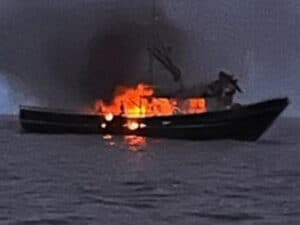
Maersk and Stena Line press ahead on methanol fueling
Written by Nick Blenkey
Image: Wärtsilä
The move to methanol continues. Yesterday, Maersk announced it had placed an order for six mid-sized containerships with dual-fuel engines able to operate on green methanol. Today, Wärtsilä announced that it has been contracted by Swedish ferry operator Stena Line to carry out and convert some of its vessels to operate on methanol.
Looking at the Maersk order first, the six 9,000 TEU ships are slated for delivery from Yangzijiang Shipbuilding in 2026 and 2027.

“With this order, we are taking another step in the green transformation of our fleet and towards our target of becoming net-zero in 2040,” said Rabab Boulos, chief infrastructure officer at Maersk. “As with all our other vessel orders for the last two years, these ships will be able to run on green methanol.”
In 2021, Maersk ordered the world’s first methanol-enabled container vessel following up on a commitment to order only newbuilds that can sail on green fuels. Just two years later, the global orderbook stands at more than 100 methanol-enabled vessels. Accounting for one quarter of that total, Maersk now has 25 methanol-enabled vessels on order. Additionally, as we have reported earlier, Maersk has big plans to retrofit existing ships for methanol fueling.
STENA LINE METHANOL RETROFITS
Sweden’s Stena Line is another long-time methanol-fueling advocate. It became the first ferry operator to run a ferry on methanol back in 2015 when the Stena Germanica was converted and its two latest battery-hybrid newbuilds, ordered for the Irish Sea route back in May will be methanol-fueled, with the company saying that it is currently working closely with suppliers and has secured future volumes of e-methanol to fulfill its strategic ambition of shifting to renewable fuels and cutting 30% of its CO2 emissions by 2030.
Today Wärtsilä said that it has been contracted to carry out methanol-fueling conversions of an undisclosed number of Stena Line vessels. The conversions will include the fuel supply system and engine modifications, as well as integrating the new installations with the ships’ existing systems. The contracts were booked as order intake by Wärtsilä in June 2023.
Converting the ferries for methanol fuel will enable them to be compliant with various existing and upcoming regulations, including the Carbon Intensity Indicator (CII), FuelEU Maritime, and IMO 2050 GHG reduction target, says Wärtsilä.
“As we continue to implement our strategy to decarbonise all our operations, we see methanol as a viable alternative fuel that will help us achieve this ambition. Wärtsilä has proven its capabilities to carry out the necessary conversions. This was shown eight years ago when they converted the Stena Germanica to operate with methanol, and our experience from this ground-breaking innovation has been very positive,” said Ian Hampton of Stena Line.
“We have had close cooperation with Stena Line for many years and we are pleased to be supporting them again in this important conversion project. Like Stena Line, Wärtsilä is committed to making decarbonized shipping operations a reality, and we have invested heavily in developing our engine portfolio to be capable of utilizing carbon neutral and zero carbon fuels,” said Roger Holm, president of Wärtsilä’s Marine Power business.
The full scope of Wärtsilä’s supply package will include fuel tank instrumentation and valves, transfer pumps, low pressure pump skid, fuel valve trains, methanol fuel pump units and the automation of the system, engine conversions, and automation upgrade for the engine control room.
The conversions are scheduled to take place in 2025.




